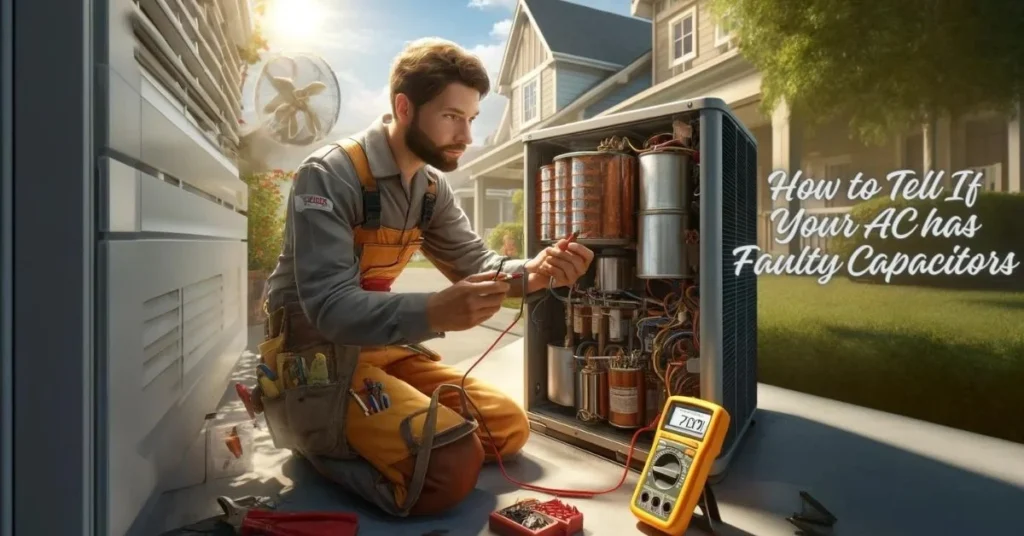In the summer heat, a functioning air conditioning (AC) unit isn’t just a luxury; it’s a necessity. Yet, like any complex machine, AC units can face technical issues, with faulty capacitors being a common culprit.
Understanding the signs of faulty capacitors can empower homeowners to seek timely repairs, ensuring their cooling systems work efficiently when needed.
If you notice your AC acting up, click the following link to find the best air conditioning repair Scottsdale has to offer.
Hard starting
Hard starting occurs when your AC struggles to turn on or takes longer than usual to start running. This symptom indicates that the capacitors, which provide the initial jolt of energy to start the motors, are not functioning properly.
Since capacitors store and release electrical energy to kickstart the compressor and the fan motors, any sign of difficulty during the beginning phase of operation often points to a capacitor issue. If you notice this phenomenon, it’s a clear signal that the capacitors might be failing and require inspection or replacement to ensure your AC runs smoothly and efficiently.
Humming noise
A distinct humming noise from your AC unit can be a telltale sign of capacitors struggling to function properly. This sound occurs when the capacitors, which are crucial for starting the compressor and fans, begin to fail and can no longer maintain a steady electrical charge.
The result is an electrical cycle that attempts to start the parts but fails, causing a continuous hum. This noise is more than just a nuisance; it signifies that the capacitors are unable to efficiently start the motors.
Prompt attention is required to replace or repair the faulty capacitors, which will prevent further damage to the AC system and restore its quiet, efficient operation.
Intermittent shutting off
When an air conditioner intermittently shuts off before completing a cooling cycle, it might indicate that the capacitors are failing. This condition, known as “short cycling,” can harm the system.
Capacitors play a pivotal role in stabilizing the voltage and providing the necessary power surge to keep the motors running. The AC unit may unexpectedly turn off if it cannot hold a charge due to wear or damage.
This can reduce the cooling system’s efficiency and cause the compressor to wear out faster. The unit may also have a shorter lifespan. Therefore, if you notice your AC shutting off intermittently, a professional must check the capacitors to prevent further issues.
High energy bills
High energy bills can often result from faulty capacitors in your AC unit. Capacitors are designed to provide efficient energy use by stabilizing voltage and offering the necessary power surges to start and keep the motor running.
When these capacitors fail, your AC system may work harder and operate longer than necessary to achieve the set temperature. This inefficiency leads to an increased demand for electricity, which consequently causes a noticeable spike in your energy bills.
Continuous operation under these conditions stresses your AC system and your wallet. Monitoring your energy consumption and seeking prompt repairs for suspected capacitor issues can prevent such cost escalations.
Age
The age of your air conditioning (AC) unit significantly impacts capacitor health and functionality. As your AC system ages, its components, including capacitors, experience wear and tear from continuous use.
Typically, capacitors have a life expectancy of five to twenty years, but this can vary based on usage intensity, maintenance practices, and environmental conditions. Over time, capacitors may lose their ability to store and release energy efficiently, leading to a decline in AC performance.
Capacitors are particularly susceptible to aging because of their electrical nature and the harsh conditions, including fluctuating voltage levels and high temperatures. As a result, older units are more likely to encounter capacitor-related issues simply because the capacitors degrade and become less effective.
Recognizing the age of your AC unit can be a critical factor in diagnosing capacitor problems. It is advisable to consider replacing capacitors—or potentially the entire AC unit.
faqs
- What are the signs of faulty capacitors in an air conditioning unit?
- Hard starting or difficulty turning on
- A distinct humming noise coming from the unit
- Intermittent shutting off before completing a cooling cycle
- Higher than usual energy bills
- Aging of the unit and its components
- How do faulty capacitors affect an air conditioner’s performance? Faulty capacitors can lead to reduced efficiency and performance of the air conditioning unit. They can cause the AC to struggle to start, operate with a continuous humming noise, shut off intermittently, and consume more energy than necessary, leading to increased operational costs and potential damage to the system.
- What causes capacitors in an AC unit to fail? Capacitors can fail due to normal wear and tear, excessive heat exposure, power surges, or as part of the natural aging process of the air conditioning unit. The lifespan of a capacitor can be affected by the intensity of use, maintenance practices, and environmental conditions.
- What should I do if I suspect my air conditioner has faulty capacitors? If you suspect that your AC unit has faulty capacitors, it is important to contact a professional air conditioning repair service as soon as possible. A qualified technician can inspect your unit, confirm if the capacitors are indeed the issue, and replace or repair them as necessary to restore efficient operation.
- Can I replace the capacitors in my AC unit myself? While it is possible for someone with electrical knowledge and experience to replace capacitors, it is generally recommended to hire a professional. This is because working with electrical components can be dangerous, and improper handling can cause further damage to the unit or lead to personal injury. A professional technician can ensure the replacement is done safely and correctly.











